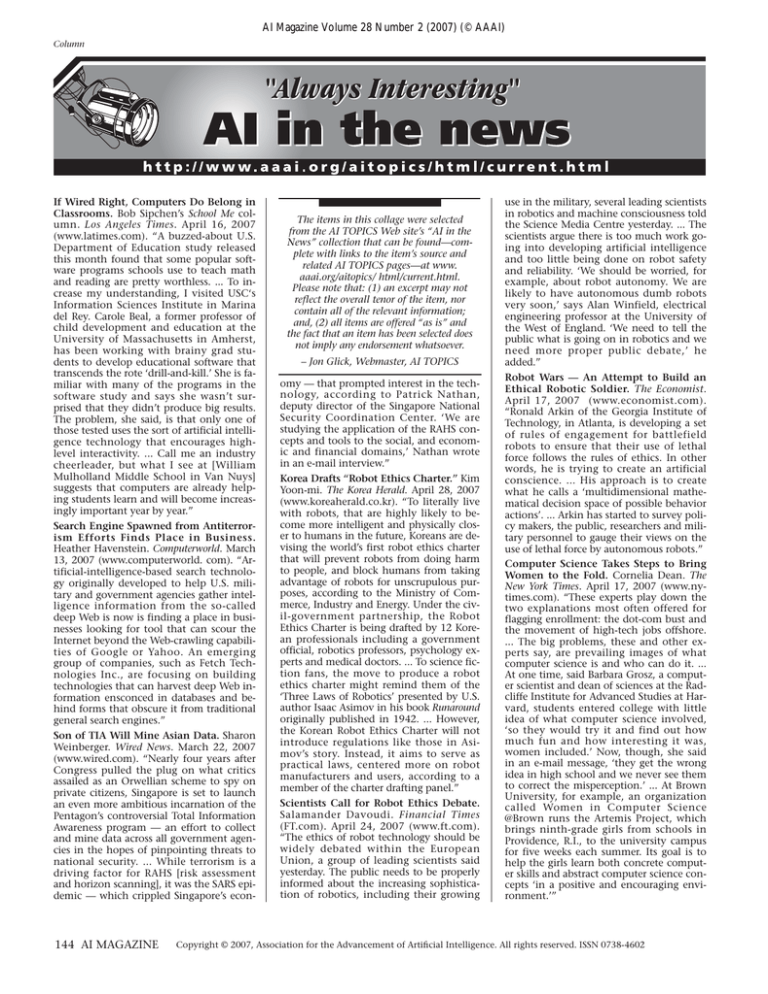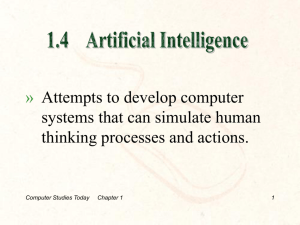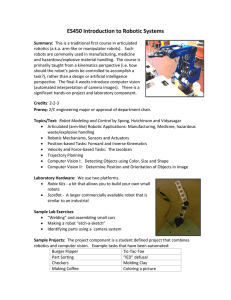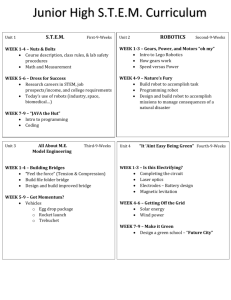If Wired Right, Computers Do Belong in Classrooms.
advertisement

AI Magazine Volume 28 Number 2 (2007) (© AAAI) Column If Wired Right, Computers Do Belong in Classrooms. Bob Sipchen’s School Me column. Los Angeles Times. April 16, 2007 (www.latimes.com). “A buzzed-about U.S. Department of Education study released this month found that some popular software programs schools use to teach math and reading are pretty worthless. ... To increase my understanding, I visited USC‘s Information Sciences Institute in Marina del Rey. Carole Beal, a former professor of child development and education at the University of Massachusetts in Amherst, has been working with brainy grad students to develop educational software that transcends the rote ‘drill-and-kill.’ She is familiar with many of the programs in the software study and says she wasn’t surprised that they didn’t produce big results. The problem, she said, is that only one of those tested uses the sort of artificial intelligence technology that encourages highlevel interactivity. ... Call me an industry cheerleader, but what I see at [William Mulholland Middle School in Van Nuys] suggests that computers are already helping students learn and will become increasingly important year by year.” Search Engine Spawned from Antiterrorism Efforts Finds Place in Business. Heather Havenstein. Computerworld. March 13, 2007 (www.computerworld. com). “Artificial-intelligence-based search technology originally developed to help U.S. military and government agencies gather intelligence information from the so-called deep Web is now is finding a place in businesses looking for tool that can scour the Internet beyond the Web-crawling capabilities of Google or Yahoo. An emerging group of companies, such as Fetch Technologies Inc., are focusing on building technologies that can harvest deep Web information ensconced in databases and behind forms that obscure it from traditional general search engines.” Son of TIA Will Mine Asian Data. Sharon Weinberger. Wired News. March 22, 2007 (www.wired.com). “Nearly four years after Congress pulled the plug on what critics assailed as an Orwellian scheme to spy on private citizens, Singapore is set to launch an even more ambitious incarnation of the Pentagon’s controversial Total Information Awareness program — an effort to collect and mine data across all government agencies in the hopes of pinpointing threats to national security. ... While terrorism is a driving factor for RAHS [risk assessment and horizon scanning], it was the SARS epidemic — which crippled Singapore’s econ- 144 AI MAGAZINE The items in this collage were selected from the AI TOPICS Web site’s “AI in the News” collection that can be found—complete with links to the item’s source and related AI TOPICS pages—at www. aaai.org/aitopics/ html/current.html. Please note that: (1) an excerpt may not reflect the overall tenor of the item, nor contain all of the relevant information; and, (2) all items are offered “as is” and the fact that an item has been selected does not imply any endorsement whatsoever. – Jon Glick, Webmaster, AI TOPICS omy — that prompted interest in the technology, according to Patrick Nathan, deputy director of the Singapore National Security Coordination Center. ‘We are studying the application of the RAHS concepts and tools to the social, and economic and financial domains,’ Nathan wrote in an e-mail interview.” Korea Drafts “Robot Ethics Charter.” Kim Yoon-mi. The Korea Herald. April 28, 2007 (www.koreaherald.co.kr). “To literally live with robots, that are highly likely to become more intelligent and physically closer to humans in the future, Koreans are devising the world’s first robot ethics charter that will prevent robots from doing harm to people, and block humans from taking advantage of robots for unscrupulous purposes, according to the Ministry of Commerce, Industry and Energy. Under the civil-government partnership, the Robot Ethics Charter is being drafted by 12 Korean professionals including a government official, robotics professors, psychology experts and medical doctors. ... To science fiction fans, the move to produce a robot ethics charter might remind them of the ‘Three Laws of Robotics’ presented by U.S. author Isaac Asimov in his book Runaround originally published in 1942. ... However, the Korean Robot Ethics Charter will not introduce regulations like those in Asimov’s story. Instead, it aims to serve as practical laws, centered more on robot manufacturers and users, according to a member of the charter drafting panel.” Scientists Call for Robot Ethics Debate. Salamander Davoudi. Financial Times (FT.com). April 24, 2007 (www.ft.com). “The ethics of robot technology should be widely debated within the European Union, a group of leading scientists said yesterday. The public needs to be properly informed about the increasing sophistication of robotics, including their growing use in the military, several leading scientists in robotics and machine consciousness told the Science Media Centre yesterday. ... The scientists argue there is too much work going into developing artificial intelligence and too little being done on robot safety and reliability. ‘We should be worried, for example, about robot autonomy. We are likely to have autonomous dumb robots very soon,’ says Alan Winfield, electrical engineering professor at the University of the West of England. ‘We need to tell the public what is going on in robotics and we need more proper public debate,’ he added.” Robot Wars — An Attempt to Build an Ethical Robotic Soldier. The Economist. April 17, 2007 (www.economist.com). “Ronald Arkin of the Georgia Institute of Technology, in Atlanta, is developing a set of rules of engagement for battlefield robots to ensure that their use of lethal force follows the rules of ethics. In other words, he is trying to create an artificial conscience. ... His approach is to create what he calls a ‘multidimensional mathematical decision space of possible behavior actions’. ... Arkin has started to survey policy makers, the public, researchers and military personnel to gauge their views on the use of lethal force by autonomous robots.” Computer Science Takes Steps to Bring Women to the Fold. Cornelia Dean. The New York Times. April 17, 2007 (www.nytimes.com). “These experts play down the two explanations most often offered for flagging enrollment: the dot-com bust and the movement of high-tech jobs offshore. ... The big problems, these and other experts say, are prevailing images of what computer science is and who can do it. ... At one time, said Barbara Grosz, a computer scientist and dean of sciences at the Radcliffe Institute for Advanced Studies at Harvard, students entered college with little idea of what computer science involved, ‘so they would try it and find out how much fun and how interesting it was, women included.’ Now, though, she said in an e-mail message, ‘they get the wrong idea in high school and we never see them to correct the misperception.’ ... At Brown University, for example, an organization called Women in Computer Science @Brown runs the Artemis Project, which brings ninth-grade girls from schools in Providence, R.I., to the university campus for five weeks each summer. Its goal is to help the girls learn both concrete computer skills and abstract computer science concepts ‘in a positive and encouraging environment.’” Copyright © 2007, Association for the Advancement of Artificial Intelligence. All rights reserved. ISSN 0738-4602


